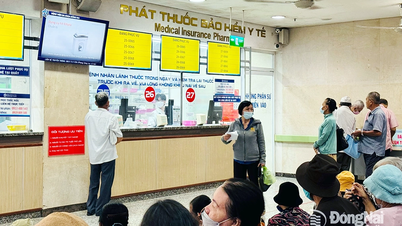Affirming the suitability and necessity of this, experts and teachers identified difficulties and proposed what needs to be done to effectively implement the Prime Minister 's direction.
Strategic move
Dr. Ton Quang Cuong - Head of the Faculty ofEducational Technology, University of Education (Vietnam National University, Hanoi) said that switching to computer-based testing is a strategic step, reflecting the inevitable trend of education in the digital age. He explained this with 4 main pillars.
Firstly, improve objectivity, transparency and fairness in education. Advanced monitoring technology (facial recognition, behavior monitoring, application locking, anti-peripheral interference...) and random exam mixing help prevent cheating effectively; perform automatic exam grading, eliminate subjectivity, reduce errors, and ensure accuracy. All exam data is encrypted and securely stored, reducing the risk of exam disclosure or score correction.
Second, increase efficiency and save costs. The system automates the functional processes of the exam, allowing registration, organization, grading, announcement of results, supervision and post-inspection, saving time, human resources and costs. The ability to organize exams in multiple sessions, shifts and locations brings flexibility and reduces pressure on facilities.
Third, it is consistent with the development trend of education and digital technology ; adapting to the digital learning and working environment. This form is synchronized with many international standardized exams, creating conditions for global educational integration and promoting educational innovation, encouraging investment in developing new technological infrastructure in education.
Fourth, big data and details about student performance from computer-based tests - a valuable resource for analyzing, evaluating teaching effectiveness, and improving educational programs - will change the philosophy of testing. That is, shifting from simple scoring to analyzing educational data, promoting evidence-based personalized learning, building personal digital profiles of learners to connect with population databases, serving the purpose of social security and human development.
According to Dr. Ton Quang Cuong, "transforming" the High School Graduation Exam in this way not only addresses the core and key objectives of the exam, but also creates a strategic "push" with comprehensive and far-reaching impacts on education.
From the practice of general education, Ms. Phan Hoang Tu Nga - Principal of Luu Van Viet High School (Vinh Long) also believes that organizing the High School Graduation Exam on computers is necessary and important, creating a professional and modern exam environment. This method minimizes human errors and limits negative factors such as cheating and leaking questions.
No need to print, transport, or store paper exams, reducing the pressure on supervisors and exam supervisors in managing and collecting exam papers. Results are automatically and objectively graded, ensuring fairness for all candidates. Exam data is digitized, helping to manage, compile, and analyze results more quickly and accurately, and to adjust and update when there are changes more flexibly...

Need to prepare carefully and comprehensively
In addition to many affirmations of the benefits of organizing high school graduation exams on computers, Ms. Phan Hoang Tu Nga also pointed out the implementation challenges. Accordingly, the first is the information technology infrastructure (not yet synchronized). Many localities, especially remote areas, still lack computer equipment; limitations in Internet connection and power grid systems, as well as the ability of students and teachers to use computers.
The issue of security, data confidentiality, ensuring safety, absolute confidentiality for exam questions, exams and results is not easy, the initial investment cost is large. Candidates, parents, education management staff, teachers are familiar with the traditional form of examination. During the examination, problems with the network, hardware, software, etc. may arise.
From there, Ms. Phan Hoang Tu Nga said that it is necessary to develop and perfect new regulations and rules for the exam that are suitable for the computer-based exam format, ensuring strictness and transparency. The conditions for organizing the exam need to be carefully prepared, such as: Synchronous and modern information technology infrastructure; training and capacity building for students and staff participating in organizing the exam...
Dr. Le Quang Minh - Deputy Director of the Institute of Information Technology, Hanoi National University, stated that organizing the high school graduation exam on computers is completely suitable and feasible. However, to implement it effectively, thorough and comprehensive preparation is needed. In particular, a clear and specific legal document system is needed first. This is a prerequisite for implementing the exam on a large scale in a synchronous manner, ensuring safety, transparency and efficiency.
According to Dr. Le Quang Minh, one of the challenges when organizing high school graduation exams on computers is the digital divide, the difference in access to technology between regions. Therefore, it is necessary to have a roadmap for strong investment in information technology infrastructure in schools, equip computers with Internet connection, and create conditions for students to master computer skills.
At the same time, organizing exams on computers requires a rich question bank, ensuring sufficient quantity, scientific and pedagogical qualities, and the ability to accurately assess learners' abilities. The exam questions need to be similar between sessions, avoiding differences in difficulty. This is especially important when organizing multiple sessions for the number of candidates up to millions each year.
Building a large question bank requires a team of professional question makers. It is necessary to research the application of artificial intelligence (AI) tools to support question makers and automatically generate questions according to a specialized training model. "Exam questions are the most important step to prepare thoroughly if organizing the High School Graduation Exam on computers," emphasized Dr. Le Quang Minh.
In addition, the Vice President of the Institute of Information Technology, Hanoi National University also mentioned the requirement that the exam organization software must ensure safety, security, and anti-cheating. The exam room space must meet standards, with a monitoring system such as front and rear cameras. The exam marking software must be intelligent, designed in detail to handle diverse situations of the test.
The software development process needs to be approved by a professional council, rigorously tested, and ensure absolute accuracy before official deployment. Along with that, the technology infrastructure and network infrastructure must be extremely stable, high-speed, and backup plans must be taken into account. Because if just a few candidates have connection problems during the exam, it will seriously affect the entire exam.
I fully support and hope that the organization of high school graduation exams on computers will come into practice as soon as possible. Implementing this will lead to a whole system of innovation and creativity, operated synchronously on a digital platform, creating a pivot to change other aspects of educational activities and social awareness about education today. - Dr. Ton Quang Cuong
Source: https://giaoducthoidai.vn/to-chuc-thi-tot-nghiep-thpt-tren-may-tinh-kien-tao-mo-thuc-moi-trong-thi-cu-post737915.html



































































![[Photo] General Secretary To Lam attends the launch of 3 digital platforms serving the implementation of Resolution No. 57-NQ/TW](https://vphoto.vietnam.vn/thumb/402x226/vietnam/resource/IMAGE/2025/7/2/d7fb7a42b2c74ffbb1da1124c24d41d3)





































Comment (0)